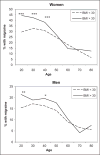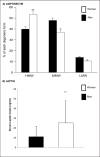Adipokines and Migraine: A Systematic Review
- PMID: 27012149
- PMCID: PMC4836978
- DOI: 10.1111/head.12788
Adipokines and Migraine: A Systematic Review
Abstract
Background: Migraine is comorbid with obesity. Recent research suggests an association between migraine and adipocytokines, proteins that are predominantly secreted from adipose tissue and which participate in energy homeostasis and inflammatory processes.
Objectives: In this review, we first briefly discuss the association between migraine and obesity and the importance of adipose tissue as a neuroendocrine organ. We then present a systematic review of the extant literature evaluating circulating levels of adiponectin and leptin in those with migraine.
Methods: A search of the PubMed database was conducted using the keywords "migraine," "adiponectin," and "leptin." In addition reference lists of relevant articles were reviewed for possible inclusion. English language studies published between 2005 and 2015 evaluating circulating blood concentration of adiponectin or leptin in those with migraine were included.
Conclusions: While the existing data are suggestive that adipokines may be associated with migraine, substantial study design differences and conflicting results limit definitive conclusions. Future research utilizing carefully considered designs and methodology is warranted. In particular careful and systematic characterization of pain states at the time of samples, as well as systematic consideration of demographic (e.g., age, sex) and other vital covariates (e.g., obesity status, lipids) are needed to determine if adipokines play a role in migraine pathophysiology and if any adipokine represents a viable, novel migraine biomarker, or drug target.
Keywords: adipokines; adiponectin; leptin; migraine; obesity.
© 2016 American Headache Society.
Figures





Similar articles
-
Signs and symptoms to determine if a patient presenting in primary care or hospital outpatient settings has COVID-19.Cochrane Database Syst Rev. 2022 May 20;5(5):CD013665. doi: 10.1002/14651858.CD013665.pub3. Cochrane Database Syst Rev. 2022. PMID: 35593186 Free PMC article.
-
Drugs for preventing postoperative nausea and vomiting in adults after general anaesthesia: a network meta-analysis.Cochrane Database Syst Rev. 2020 Oct 19;10(10):CD012859. doi: 10.1002/14651858.CD012859.pub2. Cochrane Database Syst Rev. 2020. PMID: 33075160 Free PMC article.
-
Eliciting adverse effects data from participants in clinical trials.Cochrane Database Syst Rev. 2018 Jan 16;1(1):MR000039. doi: 10.1002/14651858.MR000039.pub2. Cochrane Database Syst Rev. 2018. PMID: 29372930 Free PMC article.
-
Pharmacological interventions for acute attacks of vestibular migraine.Cochrane Database Syst Rev. 2023 Apr 12;4(4):CD015322. doi: 10.1002/14651858.CD015322.pub2. Cochrane Database Syst Rev. 2023. PMID: 37042545 Free PMC article.
-
Migraine headache and bipolar disorder comorbidity: A systematic review of the literature and clinical implications.Scand J Pain. 2016 Apr;11:136-145. doi: 10.1016/j.sjpain.2015.12.002. Epub 2016 Feb 23. Scand J Pain. 2016. PMID: 28850455
Cited by
-
Headache in Children: Selected Factors of Vascular Changes Involved in Underlying Processes of Idiopathic Headaches.Children (Basel). 2020 Oct 4;7(10):167. doi: 10.3390/children7100167. Children (Basel). 2020. PMID: 33020432 Free PMC article. Review.
-
Acute and Preventive Management of Migraine during Menstruation and Menopause.J Clin Med. 2021 May 24;10(11):2263. doi: 10.3390/jcm10112263. J Clin Med. 2021. PMID: 34073696 Free PMC article. Review.
-
Migraine and neuroinflammation: correlation of adipokines and cytokines with clinical features.BMC Neurol. 2025 Aug 13;25(1):338. doi: 10.1186/s12883-025-04319-w. BMC Neurol. 2025. PMID: 40804368 Free PMC article.
-
Neurobiology of migraine progression.Neurobiol Pain. 2022 Jun 9;12:100094. doi: 10.1016/j.ynpai.2022.100094. eCollection 2022 Aug-Dec. Neurobiol Pain. 2022. PMID: 35720639 Free PMC article. Review.
-
The metabolic face of migraine - from pathophysiology to treatment.Nat Rev Neurol. 2019 Nov;15(11):627-643. doi: 10.1038/s41582-019-0255-4. Epub 2019 Oct 4. Nat Rev Neurol. 2019. PMID: 31586135 Review.
References
Publication types
MeSH terms
Substances
Grants and funding
LinkOut - more resources
Full Text Sources
Other Literature Sources
Medical

